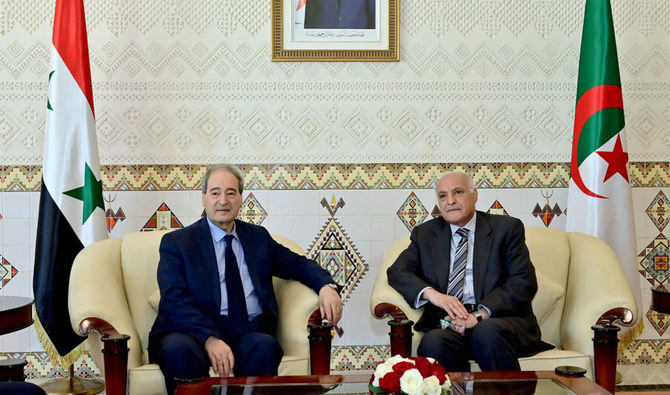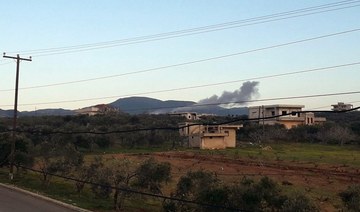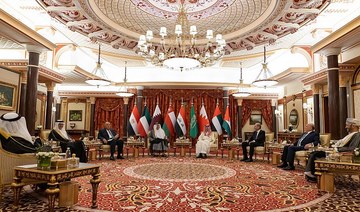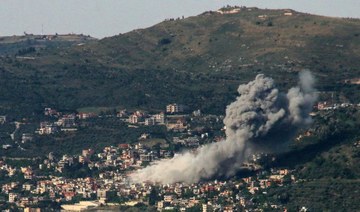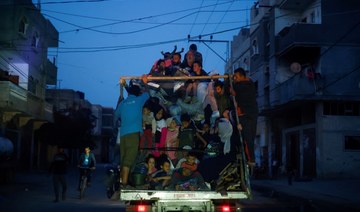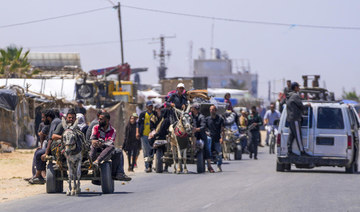BEIRUT: Lebanon’s Interior Ministry says it will implement a security plan in Beirut in coming days amid fears over the large number of illegal weapons and growing lawlessness in areas of the city and surrounding neighborhoods.
Security forces have been told to recruit 800 extra personnel as part of the clampdown, the ministry said.
The security plan was announced as Lebanon’s General Security Directorate said it is cracking down on Syrian nationals who remain in the country illegally.
The directorate told Syrian nationals who have violated the country’s entry and residence regulations to “regularize their status and leave Lebanese territory” by heading to border departments and centers immediately.
Those who ignore the order will face legal action, the statement warned.
Lebanese Army Command said on Saturday that an army unit, with support from the General Intelligence Directorate, detained several men in an operation targeting people smugglers in Deir Al-Aachayer in the Bekaa region.
A Syrian national who attacked troops with a spear was shot and later died in hospital from his wounds, the army said.
People traffickers and goods smugglers have long been a problem in the area, which overlaps Syrian territory, according to the army.
Authorities are also cracking down on illegal Syrian-owned institutions and shops, as well as businesses that employ foreign workers in violation of regulations and laws.
Media reports said the General Security Directorate will no longer grant residency permits to Syrian family members sponsored by Lebanese citizens in Lebanon.
Lebanon’s caretaker Interior Minister Bassam Mawlawi said during a meeting in Beirut that the Syrian presence “plays a fundamental role in putting pressure on security in Lebanon.”
He said that after “arduous negotiations,” the UN Refugee Agency revealed almost 1.5 million Syrians were in Lebanon “with unclear reasons for their asylum and entry dates.”
However, Lebanon estimates there are at least 2.3 million Syrian refugees in the country, most of whom are “economic refugees, not security or political refugees,” according to Mawlawi.
He said that Lebanon “cannot tolerate any economic asylum.”
Lebanese authorities have urged citizens not to employ, shelter, or provide accommodation for Syrians residing illegally in in the country. Violators face administrative and judicial procedures.
The General Security Directorate also warned Syrian refugees registered with UNHCR against engaging in paid work outside their designated sectors.
In recent months, there has been a sharp rise in the number of murders, kidnappings, and thefts in Lebanon.
Incidents have been particularly prevalent on the road to Beirut Airport and in the border area with Syria, where illegal crossings are common.
According to Interior Ministry statistics, a significant proportion of the perpetrators are Syrian, accounting for nearly 40 percent of the total detainees.
The recent killing of Pascal Sleiman, the coordinator of the Lebanese Forces Party, intensified animosity toward the Syrian presence in Lebanon.
Mawlawi said that Beirut and its suburbs, especially the road to Rafic Hariri International Airport, “will witness a security plan aimed at reassuring the people of Beirut and its residents, and restoring stability.”
The Lebanese government has declared that any Syrian who entered Lebanese territory after 2019 is considered to be illegally present in the country.
It plans to send all those who arrived after 2019 back to Syria, except detainees who may be at risk if they return.
Lebanon received a €1 billion aid package early this month from the European Commission to bolster its border controls and help stem refugee flows to Europe.
The financing will be available from the current year until 2027. However, caretaker Prime Minister Najib Mikati said there was a difference between registered refugees and those who entered Lebanon illegally and are facing deportation.
Mikati held talks in Lebanon in early May with European Commission President Ursula von der Leyen and Cypriot President Nikos Christodoulides. He pushed for recognition from Europe and the international community that most areas in Syria are now safe, which would facilitate refugees’ return home.
Independent MP Ghassan Skaf said the Syrian refugee crisis in Lebanon has become an “existential threat, and there is now a consensus about the issue.”
However, he said that dealing with the problem “must be far from populism and hate speech.”



